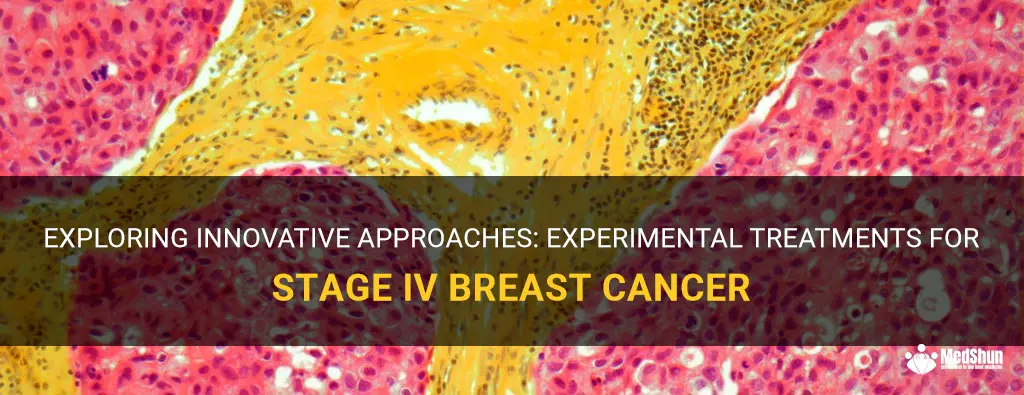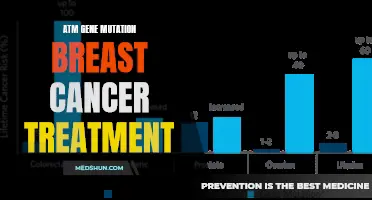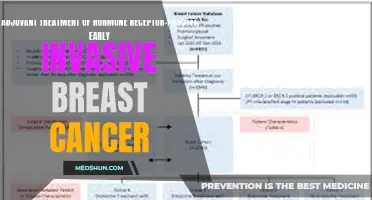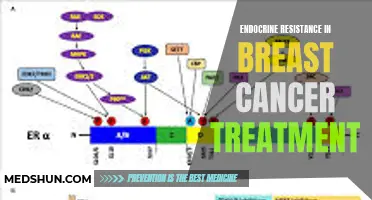
Stage IV breast cancer, also known as metastatic breast cancer, is a devastating diagnosis that poses significant challenges for patients and their healthcare providers. While traditional treatment options such as surgery, radiation, and chemotherapy have been the mainstay of care, researchers and scientists are constantly exploring new and innovative approaches to manage and potentially cure this advanced form of cancer. Experimental treatments offer a glimmer of hope for those battling stage IV breast cancer, pushing the boundaries of medical science and offering the possibility of improved outcomes and quality of life. In this article, we will take a closer look at some of the most promising experimental treatments that are being explored in the fight against stage IV breast cancer.
What You'll Learn
- What are some current experimental treatments being tested for stage IV breast cancer?
- How effective are these experimental treatments compared to traditional treatments for stage IV breast cancer?
- Are there any risks or side effects associated with participating in experimental treatments for stage IV breast cancer?
- How can someone with stage IV breast cancer find out if they are eligible to participate in experimental treatment trials?
- What are the potential costs and insurance coverage for experimental treatments for stage IV breast cancer?

What are some current experimental treatments being tested for stage IV breast cancer?
Stage IV breast cancer, also known as metastatic breast cancer, is a diagnosis where the cancer has spread beyond the breast and nearby lymph nodes to distant parts of the body. It is currently considered an incurable disease, but researchers are constantly exploring new treatment options to improve outcomes and prolong survival.
One promising experimental treatment being tested for stage IV breast cancer is immunotherapy. Immunotherapy works by stimulating the patient's own immune system to recognize and destroy cancer cells. This can be done through the use of immune checkpoint inhibitors, which are drugs that block proteins that inhibit the immune response. One example of an immune checkpoint inhibitor is pembrolizumab, which has shown promising results in early clinical trials for patients with advanced breast cancer.
Another experimental treatment being studied for stage IV breast cancer is targeted therapy. Targeted therapy is a type of treatment that specifically targets the genetic mutations or proteins that are driving the growth of cancer cells. One example of targeted therapy in breast cancer is the use of HER2-targeted drugs, such as trastuzumab and pertuzumab, which have been shown to be effective in patients with HER2-positive breast cancer. Researchers are currently exploring other targeted therapies, such as CDK4/6 inhibitors, which target proteins involved in cell division and have shown promise in clinical trials for hormone receptor-positive breast cancer.
In addition to immunotherapy and targeted therapy, researchers are also investigating the use of combination therapies for stage IV breast cancer. Combination therapies involve the use of two or more treatments together to increase their effectiveness. For example, researchers are studying the combination of chemotherapy and immunotherapy to see if they can work synergistically to destroy cancer cells. Early clinical trials have shown promising results with this approach, and further research is underway to optimize dosing and treatment schedules.
It is important to note that while these treatments show promise, they are still in the experimental stage and not yet approved for widespread use. Patients interested in participating in clinical trials for stage IV breast cancer should discuss their options with their healthcare provider. Additionally, it is important for patients to have realistic expectations as experimental treatments may not work for everyone and can have side effects.
In conclusion, there are several experimental treatments being tested for stage IV breast cancer, including immunotherapy, targeted therapy, and combination therapies. These treatments aim to improve outcomes and prolong survival for patients with metastatic breast cancer. While they show promise, further research is needed to determine their safety and effectiveness. Patients interested in these treatments should discuss their options with their healthcare provider and consider participating in clinical trials.
Managing Joint Pain During Breast Cancer Treatment: Tips and Strategies
You may want to see also

How effective are these experimental treatments compared to traditional treatments for stage IV breast cancer?
Breast cancer is one of the most common types of cancer affecting women worldwide. In its advanced stage, known as stage IV or metastatic breast cancer, the cancerous cells have spread to other parts of the body, such as the bones, liver, lungs, or brain. Traditionally, treatment options for stage IV breast cancer have included chemotherapy, hormone therapy, targeted therapy, radiation therapy, surgery, or a combination of these approaches. However, in recent years, several experimental treatments have emerged as potential alternatives or additions to the traditional treatments.
One such experimental treatment is immunotherapy, which aims to stimulate the body's immune system to recognize and destroy cancer cells. This approach has shown promise in some patients with advanced breast cancer. For example, a recent clinical trial conducted on a specific type of immunotherapy called immune checkpoint inhibitors showed that they significantly increased overall survival in patients with metastatic triple-negative breast cancer, a subtype of breast cancer known to be resistant to traditional treatments.
Another experimental treatment that has gained attention is targeted therapy. This approach involves using drugs that specifically target the genetic mutations or abnormalities present in cancer cells. In stage IV breast cancer, genetic testing is often performed to identify these mutations and guide treatment decisions. Several targeted therapies, such as HER2-targeted drugs, have been developed and have shown significant efficacy in some patients with advanced breast cancer.
In addition to immunotherapy and targeted therapy, there are other experimental treatments being explored for stage IV breast cancer. These include novel drug combinations, locoregional treatments, and stem cell transplants. Clinical trials are ongoing to assess the effectiveness of these approaches and their potential to improve patient outcomes.
However, it is important to note that while experimental treatments may offer potential benefits, they are not guaranteed to be more effective than traditional treatments. Clinical trials are designed to determine the safety and efficacy of experimental therapies, and not all experimental treatments will be successful or suitable for everyone.
It is also worth mentioning that traditional treatments for stage IV breast cancer have been refined over many years of research and clinical experience. They have shown proven effectiveness in extending life expectancy and managing symptoms in a significant number of patients. The choice of treatment for stage IV breast cancer should be made in close consultation with a healthcare professional, considering factors such as the individual's specific subtype of breast cancer, overall health, and treatment goals.
In conclusion, experimental treatments for stage IV breast cancer, including immunotherapy and targeted therapy, have shown promise in improving patient outcomes. However, their effectiveness compared to traditional treatments is still being evaluated through clinical trials. It is essential for patients to discuss all available treatment options, including experimental therapies, with their healthcare team to fully understand the potential benefits and risks before making informed treatment decisions.
Understanding the Latest Advances in Dorothy Hamill's Breast Cancer Treatment
You may want to see also

Are there any risks or side effects associated with participating in experimental treatments for stage IV breast cancer?
Experimental treatments for stage IV breast cancer can be a viable option for patients who have exhausted standard treatment options or have not responded well to traditional therapies. These experimental treatments may include clinical trials, targeted therapies, immunotherapies, or combination therapies. While they hold the promise of potentially improving outcomes, it is important to consider the risks and side effects associated with these treatments.
Risks:
- Inadequate information: Due to the experimental nature of these treatments, there may be limited data available regarding their safety, effectiveness, and long-term outcomes. The lack of evidence may pose risks as the full extent of potential adverse effects may not be known.
- Increased toxicity: Some experimental treatments may be more toxic than standard therapies, as they are still in the early stages of development. This heightened toxicity can lead to more severe side effects.
- Lack of efficacy: There is no guarantee that experimental treatments will provide a significant benefit in terms of disease control or overall survival. Patients need to carefully evaluate the risks and potential benefits before deciding to participate.
Side effects:
- Common side effects: Experimental treatments may cause side effects similar to those experienced with standard therapies, such as fatigue, nausea, vomiting, hair loss, and loss of appetite. These side effects can range from mild to severe, depending on the individual and the specific treatment.
- Unique side effects: Some experimental treatments may have unique side effects that are not typically associated with standard therapies. For example, targeted therapies can cause skin rashes, liver toxicity, or cardiovascular problems, while immunotherapies can lead to immune-related adverse events, including inflammation of various organs.
- Emotional and psychological effects: The uncertainty surrounding experimental treatments can have a significant impact on patients' emotional well-being. The stress and anxiety associated with participating in experimental treatments should not be underestimated, as it can affect a patient's quality of life.
Mitigating risks and side effects:
- Informed consent: Before participating in any experimental treatment, patients should thoroughly understand the potential risks, benefits, and uncertainties involved. An open dialogue with their healthcare provider and research team is crucial to make an informed decision.
- Patient selection: The selection process for participation in clinical trials typically includes stringent eligibility criteria to minimize risks and maximize potential benefits. Candidates for experimental treatments are carefully evaluated to ensure their safety and suitability for the study.
- Close monitoring: Patients enrolled in experimental treatments are closely monitored by healthcare professionals to identify and manage any side effects promptly. Regular check-ups, laboratory tests, and imaging studies are typically conducted to assess treatment response and monitor for any adverse reactions.
It is important to note that while risks and side effects exist, many patients with stage IV breast cancer have benefited from experimental treatments. By carefully considering the potential benefits and consulting with medical professionals, patients can make informed decisions about their treatment options. Additionally, ongoing research and advancements in medical science continually strive to improve the effectiveness and safety of experimental treatments for stage IV breast cancer.
Boosting the Immune System: An Alternative Approach to Breast Cancer Treatment
You may want to see also

How can someone with stage IV breast cancer find out if they are eligible to participate in experimental treatment trials?
Cancer research is constantly evolving, with new treatment options and experimental trials being developed on an ongoing basis. For individuals with stage IV breast cancer, participation in clinical trials can offer access to cutting-edge treatments that may not be available through standard care. However, not all patients with stage IV breast cancer may be eligible to participate in these trials. Here is a step-by-step approach to finding out eligibility for experimental treatment trials:
Step 1: Consult with your oncologist
The first step is to have a discussion with your oncologist. They will have the most up-to-date information on ongoing clinical trials and can guide you through the process. They can assess whether you meet the initial criteria for eligibility based on your medical history, current condition, and any treatment plans you are currently undergoing.
Step 2: Research available clinical trials
There are various resources available to help you locate clinical trials that are relevant to stage IV breast cancer. Websites such as ClinicalTrials.gov, BreastCancerTrials.org, and the American Cancer Society's Clinical Trials Matching Service can provide comprehensive listings of ongoing trials. You can search for trials based on location, specific treatment options, or eligibility criteria.
Step 3: Understand the eligibility criteria
Each clinical trial has specific eligibility criteria that potential participants must meet. These criteria are designed to ensure patient safety and the validity of the trial results. Eligibility factors may include age, gender, specific types of breast cancer, prior treatments received, and overall health status. It is important to review these criteria thoroughly to determine if you meet the initial requirements.
Step 4: Contact the trial coordinators
Once you have identified a clinical trial that seems suitable, reach out to the trial coordinators or contact person listed on the trial information. They can provide additional details and help determine if you meet the full eligibility criteria. They may ask for your medical records and conduct additional evaluations to assess your suitability for the trial.
Step 5: Obtain a second opinion
In cases of stage IV breast cancer, seeking a second opinion is often recommended to ensure you explore all potential treatment options. Another oncologist or specialist may have insights or access to trials that your primary oncologist may not be aware of. They can also further evaluate your eligibility for clinical trials and provide an objective assessment.
Step 6: Consider the risks and benefits
Before deciding to participate in a clinical trial, carefully weigh the potential risks and benefits. Experimental treatment trials may have unknown side effects or may not guarantee positive outcomes. Discuss these factors with your healthcare team, including potential benefits specific to your case, as well as any possible risks or discomforts associated with the trial.
Step 7: Make an informed decision
Based on information gathered from consultations, discussions with your healthcare team, and a thorough understanding of the trial specifics, make an informed decision about whether to participate. Take time to consider all aspects, balancing potential benefits against the risks involved.
It is essential to remember that eligibility for clinical trials can change over time, as researchers refine their criteria and new trials become available. Therefore, it is recommended to stay in close communication with your healthcare team and regularly revisit your eligibility based on updates in the field. Participating in clinical trials not only offers potential personal benefits but also contributes to advancing the understanding and treatment of stage IV breast cancer.
Understanding the Mechanisms of Endocrine Resistance in Breast Cancer Treatment
You may want to see also

What are the potential costs and insurance coverage for experimental treatments for stage IV breast cancer?
Breast cancer is a devastating disease that affects millions of women worldwide. Stage IV breast cancer, also known as metastatic breast cancer, is the most advanced and aggressive form of the disease. Treatment options for stage IV breast cancer often include traditional therapies like chemotherapy, radiation, and hormone therapy. However, in some cases, experimental treatments may be considered as potential options.
Experimental treatments for stage IV breast cancer are those that are not yet approved by the Food and Drug Administration (FDA) for widespread use. These treatments may still be in the research and development phase, or they may be available as part of a clinical trial. Clinical trials are carefully designed studies that evaluate the safety and efficacy of new treatments.
The potential costs of experimental treatments for stage IV breast cancer can vary greatly. Some clinical trials cover the cost of the experimental treatment itself, while others may require the participant to cover all or part of the costs. It is important to carefully review the details of each clinical trial and consult with the trial coordinator regarding any potential costs involved.
In addition to the cost of the treatment itself, there may be other expenses to consider. Travel expenses, such as transportation and lodging, may be necessary if the clinical trial is not located near the patient's home. These costs can quickly add up, especially if the trial requires multiple visits over an extended period of time.
Insurance coverage for experimental treatments can also be a complex issue. Some insurance companies may cover the costs of experimental treatments, while others may not. It is crucial to thoroughly review the insurance policy and consult with the insurance provider to understand the extent of coverage for experimental treatments. In some cases, a patient may need to obtain pre-authorization from their insurance company before participating in a clinical trial.
To assist patients with the financial burden of experimental treatments, there are organizations and programs available that provide financial assistance. These resources may help cover the cost of treatment, travel expenses, and other related expenses. It is advisable for patients to reach out to these organizations for guidance and support.
It is important to note that while experimental treatments for stage IV breast cancer may offer the potential for improved outcomes, they are not guaranteed to be effective. Clinical trials are designed to gather data and determine the safety and efficacy of new treatments. Therefore, it is important for patients to carefully weigh the potential benefits and risks before deciding to participate in a clinical trial.
In conclusion, the potential costs and insurance coverage for experimental treatments for stage IV breast cancer can vary greatly. It is important for patients to carefully review the details of each clinical trial and consult with the trial coordinator and insurance provider to understand the potential costs and coverage involved. Additionally, reaching out to organizations that provide financial assistance can help alleviate some of the financial burden associated with experimental treatments.
The Role of Hyaluronic Acid in Radiation Treatment for Breast Cancer
You may want to see also
Frequently asked questions
There are several promising experimental treatments being studied for stage IV breast cancer. Some options include targeted therapy drugs that specifically attack cancer cells, immunotherapy to stimulate the body's immune system to fight the cancer, and gene therapy to alter cancer cells' genetic makeup. Clinical trials are often available for these experimental treatments.
In some cases, experimental treatments for stage IV breast cancer can be accessed outside of clinical trials through compassionate use programs or expanded access programs. These programs allow patients to access treatments that are still undergoing testing and have not yet been approved by regulatory agencies. However, each case is evaluated on an individual basis, and access to experimental treatments can be limited.
The effectiveness of experimental treatments for stage IV breast cancer varies and is still being studied. While some experimental treatments have shown promising results and have improved outcomes for some patients, it is important to note that not all experimental treatments are successful. Patients should carefully weigh the potential benefits and risks of participating in clinical trials or accessing experimental treatments.
Like any medical treatment, experimental treatments for stage IV breast cancer can have side effects and risks. These can vary depending on the specific treatment being used. Common side effects may include fatigue, nausea, hair loss, and weakened immune system. It is important for patients to discuss potential side effects and risks with their healthcare team before undergoing experimental treatments.
There are several resources available to help patients find out about available clinical trials and experimental treatments for stage IV breast cancer. Patients can discuss options with their oncologist, who can provide information on clinical trials and treatment options. Additionally, websites such as ClinicalTrials.gov and advocacy organizations like the American Cancer Society can help patients find clinical trials and learn more about experimental treatments that may be available.







